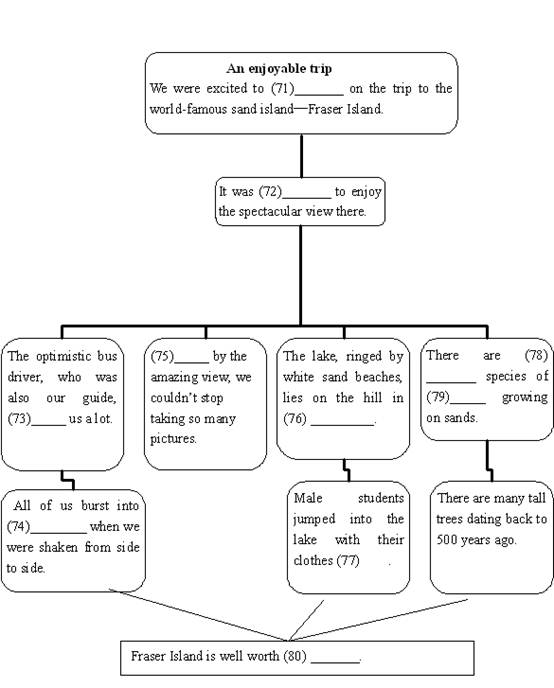题目内容
Sea water _____ many minerals, salt _____.
| A.contains, included | B.contains, including |
| C.includes, contained | D.includes , containing |
A
解析试题分析:考查动词辨析:contain包含整体,或是指含有的成分,所以第一空海水里面含有很多矿物质,用contains,include,包含个体部分,第二空含有盐,属于部分,用include,盐是被包含,用过去分词。选A。
考点:考查动词辨析
点评:contain和include辨析是常考点,要弄清基本的用法差别,做题时结合句意判断,值得注意的是:included放在名词后,incuding放在名词前。

 口算题卡北京妇女儿童出版社系列答案
口算题卡北京妇女儿童出版社系列答案The USA, New York—Whales and dolphins are facing increasing threats from climate change, according to a new report published by WWF and the Whale and Dolphin Conservation Society (WDCS).
The report "Whales in hot water?" draws attention to the growing impacts of climate change on whales.They range from changes in sea temperature and the freshening of the seawater because of the melting of ice and increased rainfalls, to a sea level rise, loss of icy polar habitats and the decline of krill populations in key areas.Krill, a tiny shrimp that is dependent on sea ice, is the main source of food for many of the great whales.
The speeding up of climate change adds greatly to trouble from other human activities, such as chemical and noise pollution, which kills some 1000 whales every day.
"Whales and dolphins have an ability to adapt to their changing environment," said Mark Simmonds, International Director of Science at WDCS."But the climate is now changing at such a fast pace that it is unclear to what extent whales and dolphins will be able to adjust."
Climate change impacts are currently greatest in the Arctic and the Antarctic.According to the report, cetaceans that rely on polar, icy waters for their home and food resources are likely to be greatly affected by the reduction of sea ice cover.
WDCS and WWF are urging governments to cut global production of C02 by at least 50 percent by the middle of this century.The latest report of the Intergovernmental Panel on Climate Change showed it was possible to stop global warming if the world's emissions start to decline before 2015.
【小题1】Which of the following is the most important for whales and dolphins?
| A.Rainfall | B.Krill | C.Sea ice cover | D.High sea level |
| A.dolphins | B.krill | C.sea horses | D.sharks |
| A.increase | B.control | C.protection | D.fall |
| A.The Pacific Ocean | B.Asia. |
| C.Two polar areas. | D.Equator. |
| A.Climate change will lead to the changes in sea temperature. |
| B.Climate change will result in the freshening of the sea water. |
| C.Climate change will have a bad effect on human activities and whales. |
| D.Human beings will forever have no ability to stop global warming. |
